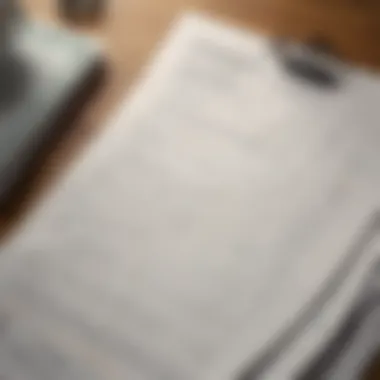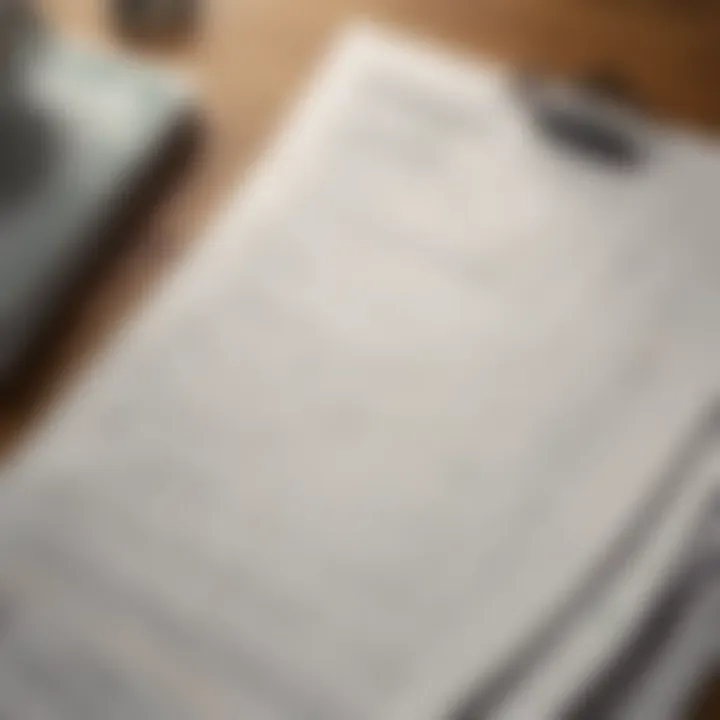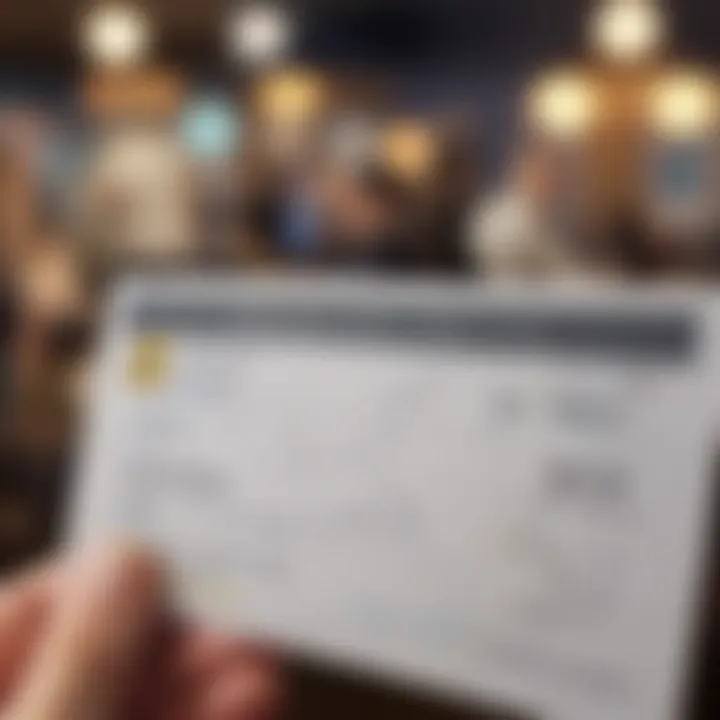Cashing a Check with an Expired ID: Key Insights


Intro
In the realm of finance, navigating the intricacies of cashing a check can sometimes feel like traversing a labyrinth, especially when forsaken identification is involved. Picture this: you have a check in hand, but your ID has more dust on it than a forgotten book on the shelf. It begs the question, what happens next? This article aims to dissect the challenges that arise when attempting to cash a check with an expired ID, equipping you with essential knowledge and strategies to overcome potential hurdles.
Underneath the surface, the problems of expired IDs can seem trivial until one finds themselves in the bank, fingers crossed, hoping the teller will accept that old document. But take a moment to understand the broader implications. Expired identification is not merely an administrative nuisance; it raises concerns about identity verification, fraud prevention, and, ultimately, your access to funds.
This exploration will cover the legal context, outlining what banks generally require in such situations. Additionally, it will spotlight alternative options for securing the cash you need. For individuals facing this common dilemma, understanding the nuances can make all the difference between smooth sailing and running aground.
So, whether you're an investor navigating personal finances, a financial advisor counseling clients, or simply someone seeking clarity, let’s transition into the particulars of what lies ahead.
Investment Terminology Breakdown
Essential Terms Explained
When discussing cashing checks, especially in relation to expired IDs, it is crucial to grasp some key terms:
- Valid Identification: This refers to government-issued documents that have not exceeded their expiration date. They are essential for establishing your identity in financial transactions.
- Fraud Prevention: Measures taken by institutions to guard against identity theft and financial fraud, generally involving stringent ID checks.
- Check Cashing Policies: The specific rules each bank sets forth regarding how and when checks can be cashed, particularly regarding identification.
Understanding these terms is important for anyone who is trying to avoid unnecessary headaches in the future.
Common Misconceptions in Finance
Many people operate under the assumption that as long as they possess an ID, cashing a check should be straightforward. This belief raises some prevalent misconceptions:
- It’s OK to Cash a Check with Any ID: Not all identification is created equal. Expired IDs may meet your needs, but they seldom meet bank standards.
- All Banks Have the Same Policies: On the contrary, different banks can have varied requirements when it comes to expired identification. It’s always wise to check ahead.
- Once Expired, an ID Holds No Value: While it’s technically true that an expired ID isn’t valid, some banks may offer alternatives, especially if you have supplementary documents to support your identity.
"Don't let an expired ID put the brakes on your financial transactions. Proper research and preparation can keep you in the driver’s seat."
As we transition deeper into the labyrinth of bank policies and backup options, one must remember that awareness and preparation are your best allies.
Navigating Bank Policies
Understanding the typical protocols can arm you with the information you need when encountering bank tellers.
- Inquire Directly: Rather than assuming, reach out to your bank. A quick call can save you a trip.
- Alternative Forms of Verification: Some institutions might accept a combination of expired IDs with recent utility bills or other documents showing your name and current address.
- Second Opinions: If a teller denies your request, don’t hesitate to ask for a supervisor’s input—it can be a game changer.
Knowing these points will not only elevate your confidence but potentially lead to a smoother transaction.
Culmination
This reality emphasizes the importance of valid identification and the necessity for individuals to stay ahead of the expiration game, ensuring that when you have a check in hand, you can cash it without unnecessary complications.
Prologue
In the world of finance, identification serves as a fundamental gateway to accessing various services, including cashing checks. The importance of understanding how to navigate these systems, particularly when faced with an expired ID, cannot be overstated. Identification isn’t just a formality; it's a security measure designed to protect both individuals and institutions from fraud. Without valid ID, one may find themselves in a quandary, unable to access funds that are rightfully theirs.
The importance of this topic lies not just in the process itself, but also in the consequences of failing to comply with identification requirements. When cashing a check, financial institutions have established strict protocols. The widespread use of checks necessitates a thorough understanding of these procedures to ensure that transactions go smoothly. Moreover, knowing the alternatives available when you have an expired identification can alleviate some of the frustrations that many face when dealing with such scenarios.
The Importance of Identification in Financial Transactions
Identification plays a crucial role in financial transactions for several reasons. Firstly, it helps in verifying the identity of individuals, ensuring that the person cashing the check is indeed the rightful owner. This is a basic yet essential step to prevent identity theft and fraudulent transactions. Financial institutions are increasingly adopting stringent measures to ascertain that the individuals they are dealing with are legitimate.
Consider this: if someone tries to cash a check that isn't theirs, the lack of proper identification makes it nearly impossible for them to succeed. This layer of security is what keeps the financial system functioning effectively. It also supports legal accountability, allowing institutions to track transactions and reduce the risk of loss.
Another reason why identification matters is the trust factor it fosters between clients and banks. Customers are more likely to feel secure when they know their financial institution places a high priority on verifying identities. The added layers of checks and balances create a safer environment for all parties involved, establishing the credibility and reliability of financial systems.


Overview of Check-Cashing Procedures
Cashing a check can appear straightforward, but a web of processes underpins this seemingly simple task. When an individual approaches a bank or check-cashing service, several steps are typically involved. The first step usually requires presenting a valid form of identification. Bank tellers often follow specific algorithms or protocols to check the authenticity of that ID against the customer's account information.
After the identification is verified, the next step is to review the check itself. Staff must examine it for signs of manipulation or forgery, checking factors such as:
- The signature on the back of the check
- The check's date and amount
- The issuing bank’s information
If all checks out without any hitches, the final stage is cashing the check, allowing the customer to receive their funds. However, complications arise when the ID presented is expired. Not all institutions handle expired identification the same way, leading to potential difficulties or outright refusal of service.
In summary, this section serves as a foundational understanding of the importance of identification and the procedural dynamics of cashing checks. The ensuing parts of this article will delve deeper into the details surrounding cashing checks with an expired ID, illuminating potential challenges and offering strategies for navigating this complex landscape.
The Role of Identification Documents
Identification documents serve as more than just a piece of paper with a name on it; they represent an individual's proof of identity, often critical in financial transactions. Understanding the role they play when cashing checks, especially with expired IDs, is vital for smooth banking operations. Banks rely on these documents to ensure they are dealing with the right person. When an ID is expired, it raises red flags for bank personnel and can complicate an otherwise straightforward process. Having proper identification is also a matter of legality and security, safeguarding both the individual and the institution against deception and fraud.
Types of Acceptable Identification
Different banks may have varied standards for acceptable identification, yet some documents consistently make the cut. Here’s a breakdown of commonly accepted types:
- Government-issued IDs: These include passports, driver's licenses, and state IDs. They usually contain the person's portrait, signature, and other key information.
- Social Security card: While not a photo ID, it proves your identity and is often used alongside another document.
- Employee identification cards: These may work in tandem with other forms of ID but are less reliable on their own.
- Utility bills or bank statements: A recent document displaying your name and address can often help establish identity when paired with other IDs.
Remember, acceptable types can vary from one institution to another, so it is prudent to confirm ahead of time.
What Constitutes an Expired ?
An expired ID is simply a valid identification document that has passed its official expiration date. This can include:
- Driver’s licenses: Typically expire every few years and need renewing.
- Passports: Usually more lengthy but also come with an expiry.
- State-issued IDs: Similar to drivers' licenses but for individuals without a driving permit.
An expired ID legally may not serve its intended purpose. For a bank, an expired document lacks validity, and that can stop you in your tracks when trying to cash a check. Some banks show a little leniency, allowing for an expired ID if accompanied by other forms of verification, but this is not a guarantee. Therefore, it's essential to check your IDs regularly and renew them as needed, avoiding the situation altogether.
Bank Policies on Expired Identification
In today’s financial landscape, understanding how banks handle expired identification is crucial, particularly when it comes to cashing checks. As many financial transactions hinge on proper identification, knowing a bank’s policies can save a person from potential headaches. Institutions generally establish rigid guidelines to safeguard against identity theft and fraud. When an expired ID is presented, it raises flags and questions the validity of the identification, limiting the options available for cashing a check. Here, we delve into general guidelines that most banks adhere to and highlight how these can vary across different financial institutions.
General Guidelines for Cashing Checks
When it comes to cashing checks with an expired ID, the initial hurdle usually involves understanding the bank’s standard operating procedures. While the specifics can shift slightly between banks, many common practices emerge:
- Acceptance of Expired IDs: Most banks will generally require identification to be current. Nonetheless, some banks operate on a more flexible basis, permitting checks to be cashed with expired IDs if accompanied by supporting documentation.
- Additional Documentation: You may need to provide supplementary proof of identity—thus, having a few backups can be advantageous. This could include a utility bill with your name or an expired ID showcasing recent updates such as changes in your address.
- Speaking to Bank Officials: When trying to cash a check with expired identification, interacting with bank staff can yield varied results. A simple request to speak with a branch manager can sometimes allow exceptions based on past performance or history with the bank.
"Checking with your bank’s staff can often open doors; sometimes, it just takes a friendly conversation to navigate around strict policies."
- Deposit as an Alternative: If immediate access to cash isn’t a pressing matter, consider depositing the check into your account to avoid potential policy issues. This could be a lifesaver in situations where the check’s funds aren't urgently required.
Variations Among Financial Institutions
It’s essential to understand that not all banks are cut from the same cloth. There lies a significant degree of variability in how different financial institutions approach the idea of expired identification. Factors influencing bank policies include:
- Institution Size: Larger banks with more stringent compliance requirements tend to enforce tougher rules around expired identifications. In contrast, smaller, community-focused banks may take a more lenient stance.
- Trust Levels: If a customer boasts a long-standing relationship with their bank, there’s often a greater chance they can cash a check even with an expired ID. Banks that value customer loyalty may allow for some flexibility.
- Regional Differences: Policies can also vary by region, influenced by local regulations and banking laws. For instance, what might be acceptable in one state could differ drastically in another.
This variance underlines the importance of not assuming all banks will respond similarly. Prior research and perhaps direct inquiry to the specific institution in question can illuminate guidelines around identifying documentation.
In summary, navigating cashing a check with an expired ID might feel daunting, but a clear grasp of bank policies—and the nuances among financial institutions—can empower individuals to approach the situation more confidently. Armed with knowledge about what to expect, one can better prepare themselves for potential challenges.
Potential Challenges


Cashing a check with an expired identification card is not just a walk in the park, and understanding the potential challenges can help avoid some nasty bumps along the way. Every financial transaction hinges on trust and verification, and an expired ID presents hurdles that could hinder that smooth transaction process. In this section, we’ll explore the intricacies of identity verification and the ominous specter of fraudulent activities, both of which can complicate the seemingly simple act of cashing a check.
Identity Verification Issues
When one approaches a bank or check-cashing service with an expired ID, they might face significant challenges regarding identity verification. Banks rely heavily on current identification to confirm the authenticity of an individual's identity, as well as to ensure compliance with regulatory standards. An expired ID adds a layer of complexity because it raises immediate red flags during the verification process.
Institutions are usually keen on following stringent protocols. For instance, they might require additional proof of identity, which could include a utility bill, social security card, or a recent bank statement with the same name and address. This can turn into quite the scavenger hunt, especially if the individual finds themselves without the necessary documents readily available.
Moreover, the staff might be concerned about liability and potential legal repercussions. They may hesitate to process transactions that aren’t in line with their established policies, worried that they could be inadvertently facilitating fraud or other illicit activities. Banks face pressure from both legal frameworks and public trust to ensure they are not enabling identity theft. Therefore, even if someone is who they claim to be, proving it beyond doubt can feel like an uphill battle when dealing with an expired ID.
Risk of Fraudulent Activities
The shadows of fraudulent activities loom large when it comes to cashing checks with outdated identification. Financial institutions are on constant alert, engaging in a balancing act between providing service and safeguarding against fraud. An expired ID can serve as a gateway for someone looking to perpetrate nefarious activities.
Consider the consequences: if an individual uses an expired ID, it raises a host of alarm bells. What if the check is stolen? What if it’s altered in a way that makes it appear legitimate? Banks must tread carefully to prevent being swindled. They often invest heavily in fraud prevention mechanisms, and an expired ID could trigger various checks in their system, leading to lengthy deliberations while the staff investigate the credentials of the individual attempting the transaction.
"With an expired ID, it’s not just about who you are; it’s also about who you say you are, and that conversation can get complicated very fast."
Fraudulent activities can take various forms, from check forgery to identity theft. Financial institutions often look for patterns that could indicate fraud, which makes them highly cautious. The combination of an expired ID and a check opens up numerous questions that need answering. They may ask for alternative documents or refuse the transaction altogether, leaving the individual scrambling for possible options.
By understanding these challenges, individuals can better prepare for the hassle, ensuring they have the necessary documentation and backup plans in place. Avoiding expired IDs altogether could be the best course, but in cases where that’s not an option, being proactive can help mitigate these potential snags.
Legal and Financial Implications
Cashing a check with an expired ID presents various legal and financial implications that should not be taken lightly. Understanding these implications is crucial for anyone navigating this somewhat murky water, as it can have lasting impacts not only on personal finances but also on legal standing with institutions.
One of the first considerations is the state regulations surrounding the use of identification in financial transactions. Different states often have unique laws regarding what constitutes acceptable identification, and this extends to expired documents. Some states might allow the use of an expired ID for certain transactions, while others impose strict guidelines that require all IDs to be current. This can lead to confusion and even potential legal issues if individuals are unaware of their state's specific rules.
Moreover, the implications go beyond just legal stipulations. Consider the potential financial risks involved. Attempting to cash a check with an expired ID might result in halted transactions or delays, causing frustration and maybe even financial strain. In some cases, financial institutions could refuse the transaction altogether, which can lead to bounced checks if the recipient isn't properly informed.
It’s essential to grasp these implications clearly:
- Legal Compliance: Knowing state regulations helps avoid any legal trouble.
- Financial Impact: Delays in cashing checks can lead to missed opportunities or unforeseen fees.
- Transparency with Financial Institutions: Understanding what your bank requires can save time and stress during the transaction process.
The importance of understanding state regulations cannot be overstated; non-compliance could lead to significant problems down the line.
State Regulations on Identification
State regulations regarding identification can vary widely across the United States. What might be acceptable in one state could very well be unacceptable in another. The primary challenge arises from mixed messages regarding expired forms of identification. Some states, like California, have relatively lenient policies, allowing an expired ID to hold potency under certain circumstances, particularly for checking accounts. However, states such as New York uphold strict rules where only valid IDs are considered acceptable in banking transactions. Before one attempts to cash a check with an expired ID, it's prudent to consult the local statutes or the respective bank’s guidelines.
Individuals affected by these regulations can also turn to bank representatives for clarification. Most banks have clearly delineated policies available on their websites or through customer service, which can serve as a resource based on the resident's location.
Consequences of Non-Compliance
Failing to comply with the necessary identification regulations could present serious repercussions. On a simple level, non-compliance often results in immediate denial of service. Essentially, the bank may refuse to cash the check, leading to significant inconvenience for the intended recipient. Beyond just the denial itself, potential consequences can spiral into longer-term implications. If a check cannot be cashed and the funds are time-sensitive, this could lead to:
- Bounced Checks: If payment is disrupted, it can lead to bounced checks, affecting one's credit score.
- Legal Actions: In the worst-case scenarios, unresolved disputes can lead to legal actions against the check writer.
- Financial Penalties: Most banks will impose penalties or fees on unpaid transactions.
All in all, understanding the repercussions of non-compliance with state and bank regulations not only prepares individuals for obstacles but also provides a framework for strategically approaching financial matters with expired identification.
Alternatives to Cashing a Check
Cashing a check with an expired ID can indeed be a rocky road filled with hurdles. So, diving into the alternatives becomes crucial. Understanding various options can save individuals from facing the dreaded scenario where a check simply won't be cashed due to identification issues. The alternatives not only provide potential lifebuoys but also shed light on ways to navigate this financial waters while minimizing inconvenience.
Use of a Third Party
One alternative approach involves utilizing a third party, such as a trusted family member or friend. This method often hinges on a simple premise: the third party has valid identification and can cash the check on your behalf. While this idea sounds straightforward, a few factors warrant consideration:


- Trust: Ensure the person you select is trustworthy. It's not just about cashing a check; it's about maintaining a relationship and ensuring no misunderstandings occur.
- Documentation: Generally, the third party will need to present their ID, along with your signed authorization. This can sometimes involve a written note, explicitly stating that this individual is allowed to cash the check for you.
- Financial Institution Policies: Not all banks or credit unions allow this practice. Therefore, it’s wise to call ahead or check their website to understand what rules might apply to cashing checks for someone else.
Engaging a reliable third party can be a great short-term fix if the need is urgent but check with the institution before proceeding.
Mobile Deposit Options
Another convenient alternative includes using mobile deposit features provided by many banks. With mobile banking apps now commonplace, depositing a check via a smartphone has become easier than pie for many people. Here’s how it generally works:
- Download Your Bank's App: Ensure you have the mobile app of your bank installed and registered.
- Follow the Steps: Open the app, navigate to the deposit section, and take clear pictures of the front and back of the signed check. The app will usually guide you through this process.
- Confirmation: After submitting your deposit, keep an eye out for a confirmation notification. This ensures there's no mix-up on whether the check was successfully deposited.
However, a few things to keep in mind are:
- Eligibility: Some banks may require valid identification to register for mobile deposit, which poses a challenge if your ID is expired.
- Timeframes: Deposits via mobile typically take longer to clear than an in-person transaction. Patience can be a virtue in this case.
- Daily Limits: Mobile deposit usually comes with limits on the amount you can deposit per day.
Incorporating these digital solutions has redefined the banking landscape. There's no more waiting in long lines and less hassle overall when grumpiness hits.
"Being prepared with alternatives can significantly reduce the strain of handling financial transactions, particularly when faced with identification issues."
All in all, knowing the different avenues for cashing checks not only empowers individuals but also ensures that they won’t be caught flat-footed. This knowledge is not just power—it's financial freedom.
Practical Steps to Take
Navigating the world of banking can be daunting, especially when dealing with unconventional situations like cashing a check with an expired ID. Understanding the practical steps to take in this scenario is not just about convenience; it’s about ensuring compliance with regulations and safeguarding one’s financial interests. Knowing how to approach this challenge can make a meaningful difference in your experience with financial institutions.
Renewing Your Identification
Renewing an expired ID should be at the top of your to-do list if you find yourself in this situation. The process itself isn’t overly complicated, but it does require knowing where to start.
- Research Local Requirements: Each state or country has its own regulations regarding ID renewal. Familiarize yourself with the specific rules in your area, which might include documents needed, fees, and time frames.
- Prepare Necessary Documents: It’s important to gather all required documents beforehand. This often includes proof of residency, old identification, and possibly a birth certificate depending on local laws.
- Consider Online Options: Many jurisdictions now allow online renewal processes. If you can do it electronically, it saves time and effort. However, be cautious to use official government websites to avoid scams.
Having a valid ID not only makes financial transactions smoother but helps in other aspects of life, such as applying for services or travel. So, handling your ID renewal promptly is crucial.
Communicating with Your Bank
To cash a check with an expired ID, communication with your bank is key. Here’s how to effectively engage with your financial institution:
- Contact Customer Service: A phone call or visit to your local bank branch can clarify the bank's policy regarding expired IDs. Keep a notepad handy to jot down important details or solutions they provide.
- Explain Your Situation: Be upfront about your expired ID and the necessity of cashing the check. Most banks might be willing to offer alternatives or guidance.
- Request a Temporary Solution: Ask if there’s a way to temporarily verify your identity through other means. Some banks might allow you to use a secondary form of ID or additional verification methods.
By establishing clear lines of communication with your bank, you can alleviate stress and pave the way to a successful transaction, even if your ID has seen better days.
"An ounce of prevention is worth a pound of cure." While addressing an expired ID is an inconvenience, proactive communication can prevent hurdles later on.
Taking these practical steps not only enhances the likelihood of cashing your check successfully but also fosters a positive relationship with banking institutions, which can be beneficial in the long run.
Culmination
Cashing a check with an expired identification presents a myriad of challenges and implications, both for the individual attempting the transaction and the financial institutions involved. This article has highlighted essential elements that underscore the importance of valid identification in maintaining the integrity of financial transactions. As we've seen, banks and other institutions have established stringent policies aimed at preventing fraud and ensuring that all parties involved are properly identified. This necessity cannot be overstated; without verification, the risk of financial mismanagement increases.
In summary, navigating the complexities surrounding expired IDs demands comprehensive understanding of bank policies, state regulations, and practical steps available to individuals. Here are some key takeaways from our exploration:
Summarizing Key Takeaways
- Identification Necessity: Always ensure your ID is current before attempting to cash a check.
- Bank Policies Vary: Different institutions have unique stances regarding expired IDs. Familiarize yourself with your bank's policies to avoid complications.
- Legal Implications: Awareness of local laws regarding identification can help prevent unexpected legal consequences.
- Alternatives Exist: There are multiple avenues available for cashing checks, including third-party services and digital options.
By being proactive and prepared, individuals can maneuver through the hurdles associated with expired identification. It's crucial to prioritize valid IDs in financial planning to avoid being caught off guard with outdated documents. Understanding these nuances empowers individuals to take control of their financial transactions.
Encouraging Proactive Financial Practices
To navigate the world of finance effectively, establishing proactive financial practices is vital. Here are a few recommendations:
- Regularly Check ID Status: Make a habit of checking expiration dates on identification documents well ahead of time.
- Consider Digital Options: Utilize mobile banking apps that may allow for deposits without the immediate need for physical IDs.
- Build Relationships: Develop rapport with your bank or local credit union. Establishing a relationship can sometimes yield flexibility in policies during unexpected situations.
- Stay Informed: Keep abreast of financial legislation relating to identification in your state. Knowledge is power, especially when it concerns financial dealings.
Taking these steps can greatly mitigate the challenges faced when dealing with check-cashing or any financial transaction requiring identification. By fostering a proactive attitude, individuals not only enhance their financial literacy but also contribute to more secure and trustworthy financial environments.



